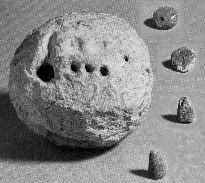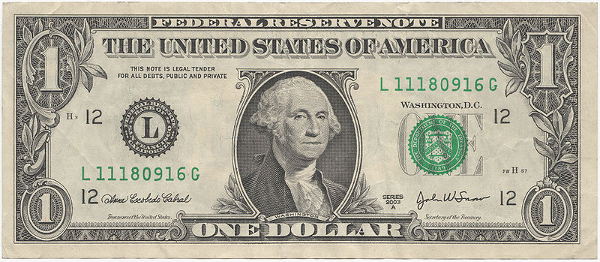A short history of money.
Before 2.500 B.C., in the cities in the valleys of the Tigris, the Euphrates, the Indus and the Nile rivers, there existed a very special type of coinage.
The people brought their excess products to the temples of the walled cities and there, the priest-accountants opened an account for each person, with clay tablets, recording the deposit of their products in the temple’s store-houses and establishing a quantity of abstract money corresponding to the merchandise deposited.
Subsequently, if these same people wished to acquire other types of products from the temple, the inverse procedure was followed.
For each transaction, a document made of baked clay was created, with the name of the buyer, the merchandise exchanged and the quantity of monetary units involved. This is what we call an «Invoice-cheque».
 For important transactions and for transactions between different cities, a system of guaranteed transport was established, based on «bullae». In the carrier’s cart, a baked clay ball was carried, which contained in its interior the tablets which represented the merchandise being transported. The list was also engraved on the outside of the ball. Upon arrival, the ball was opened and the contents of the cart was checked.
For important transactions and for transactions between different cities, a system of guaranteed transport was established, based on «bullae». In the carrier’s cart, a baked clay ball was carried, which contained in its interior the tablets which represented the merchandise being transported. The list was also engraved on the outside of the ball. Upon arrival, the ball was opened and the contents of the cart was checked.
The area became increasingly peaceful in those years, partly because of the protection afforded by the cities’ walls, and partly because of the prosperity which resulted from this system of exchange.
The coinage was an abstract instrument, the value of which was derived from a physical merchandise. Each commercial transaction left its corresponding judicial record, in the form of clay tablets.
All this came to an end with the appearance of anonymous coins made of gold, silver, copper and bronze. This new type of coinage, anonymous, concrete and independant of merchandise, makes corruption and bribery much easier.
With the appearance of anonymous coinage, in 2,500 B.C., came the advent of private banking, an authentic «power in the shadows». And the temple servants changed their trade and dedicated themselves to inventing religions.
From that moment on there was a return to imperialism. The impenetrable walls fell, not to the hammer-blows of the as-yet non-existant catapults and cross-bows, but to the bribing of some of the guards by the besieging forces. Later, the traitors could be quietly executed and the invadors could invent myths such as the «Wooden Horse of Troy» and the «Trumpets of Jericho».
Anonymous coinage was to continue its evolution, until it became today’s bank notes and bearer cheques. The various political institutions created to give citizens the illusion of being protected by them suffer the onslaught of the «wielders of power» who bribe and corrupt politicians, specialists and judges.
And now we come to the economic proposals of the Joan Bardina Studies Center. Our feeling is that we should return to a non-anonymous, responsabilising exchange system, similar to that of the ancient temples but using today’s technology to implement afresh the «invoice-cheque».
To achieve this, it will be necessary to set up a public data-transmission system, free of charge and which all are obliged to use. There must also be a series of guarantees to avoid the concentration of power which control of this network would imply.
Among these guarantees, we propose a genuine separation of the executive, legislative and judicial functions. The judicial system, independant of the executive and legislative systems, should be allocated a fixed percentage of the state’s general budget assigned by constitutional mandate, and not have organs such as the «Consejo General del Poder Judicial» («General Council of the Judiciary»), which exists in the Spanish state and which pretends to control the judicial system according to the dictates of the dominant political parties via the executive and legislative branches.
We believe that control of the population by means of data networks is already being exercised by private banks via their networks. Our proposal, rather than the creation of a new network, would tend to bring order to existing networks, so that the private information about each individual is at the disposal of that person, and of the justice system, should judicial proceedings are instigated. Statistical information on the economy as a whole should be at the disposition of all its members.
An important aspect which must be borne in mind is that, with this reform, the community must guarantee a minimum income for all those who do not have a means of support, whether a job, or any kind of pension. Logically, with this system, the debasing means of achieving income from the submerged economy would disappear.
To balance the budget, we propose a hypothesis which, should it work out, could provide this basic income or social salary without the need for onerous tax systems. This hypothesis is based on the community wealth that could be created within the economy, based on excesses of production and the money which could be invented to acquire them. This money would be distributed among the most needy.
Agustí Chalaux de Subirà.
Brauli Tamarit Tamarit.
